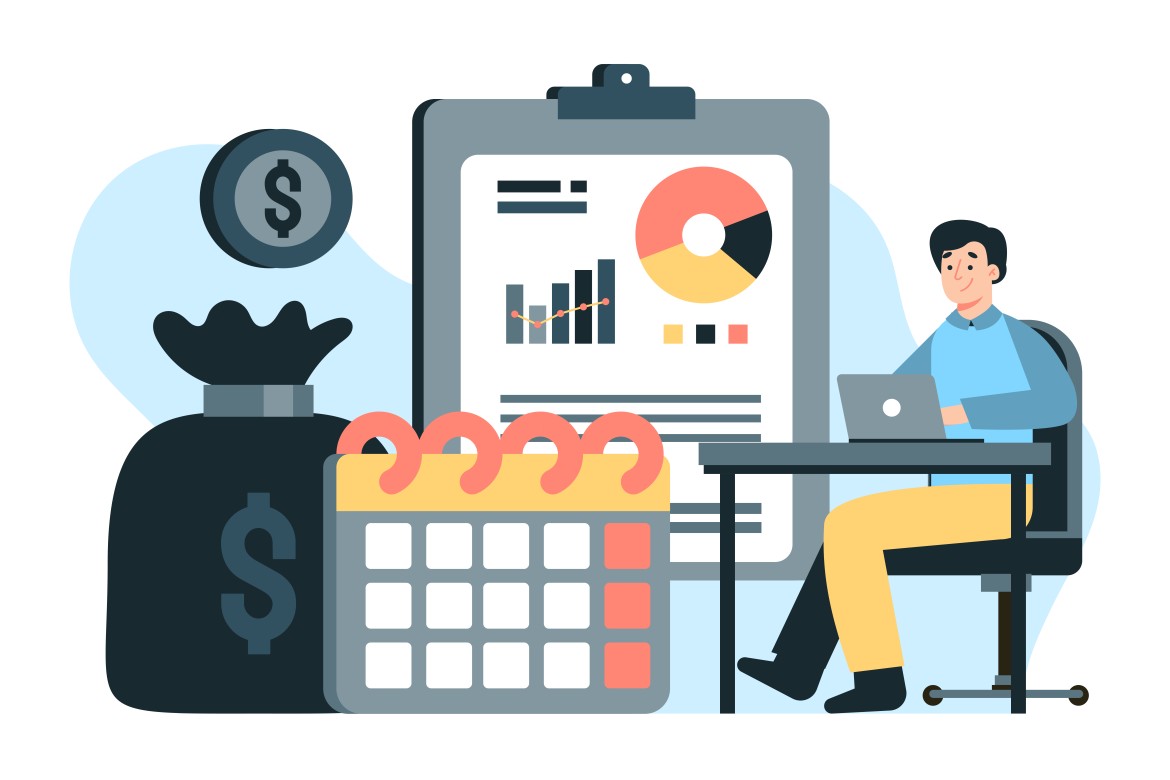Businesses are often mired with challenges when it comes to tax preparation, payroll, and managing their financial records. To streamline operations and ensure accurate financial reporting, it is crucial to invest in the right accounting solution. In this blog post, we will provide you with a summarized list of the top accounting solutions available in the market, along with their pros and cons, to help you make an informed decision.
What is an Accounting Solution?
An accounting solution is software designed to streamline and automate financial processes, helping businesses manage their tax returns and financial records, transactions, and reporting. It typically includes features such as general ledger management, accounts payable and receivable, invoicing, expense tracking, financial reporting, and often integrates with other business systems.
Why Do You Need an Accounting Solution for Your Business?
1. Efficient Financial Management
An accounting solution automates tasks, reduces manual errors, and improves efficiency in managing financial processes, such as recording transactions, reconciling accounts, doing payroll taxes, and generating financial reports.
2. Accurate Financial Reporting
With an accounting solution, you can generate accurate and timely financial reports, such as balance sheets, income tax statements, and cash flow statements. This ensures transparency, compliance, and informed decision-making.
3. Time and Cost Savings
Automating routine accounting tasks saves time, allowing you to focus on strategic financial and tax planning and analysis. It reduces the need for manual data entry, minimizing errors, and saving costs associated with manual processes.
4. Enhanced Decision-Making
Accounting solutions provide real-time insights into your business’s financial health, allowing you to make data-driven decisions. You can monitor key performance indicators, track expenses, identify profitability trends, and plan for future growth.
5. Streamlined Collaboration
Many accounting solutions offer collaboration features, enabling seamless communication and data sharing between accountants, bookkeepers, and other stakeholders. This fosters better teamwork and ensures everyone is working with up-to-date financial information.
Want to streamline your financial operations with powerful accounting solutions?
Contact Growth Hackers
The Top Accounting Solutions For your Business
1. QuickBooks Online
QuickBooks Online is a widely popular cloud-based accounting software suitable for small to medium-sized businesses. It offers a comprehensive range of features, including invoicing, expense tracking, financial reporting, and inventory management.
Pros:
- User-friendly interface with easy navigation.
- Seamless integration with third-party apps and services.
- Accessible from anywhere with an internet connection.
- Automatic backup and data security measures.
- Excellent customer support and extensive online resources.
Cons:
- Limited scalability for larger businesses with complex accounting needs.
- Some advanced features require add-ons or higher subscription tiers.
- Customization options are somewhat limited.
2. Xero
Xero is another cloud-based accounting solution that caters to businesses of all sizes. It provides robust features such as bank reconciliation, invoicing, expense tracking, and project accounting, making it a preferred choice for many.
Pros:
- Intuitive and visually appealing interface.
- Extensive integration options with popular business tools.
- Robust inventory management capabilities.
- Multi-currency support for global businesses.
- Strong collaboration features for accountants and clients.
Cons:
- Advanced features may require additional costs.
- Limited user permissions and role-based access controls.
- Customer support can be slow during peak times.
3. Sage Intacct
Sage Intacct is a powerful cloud-based accounting software designed for mid-sized and larger businesses. It offers advanced financial management capabilities, including accounts payable and receivable, project accounting, payroll, revenue recognition, and multi-entity consolidation.
Pros:
- Highly customizable and scalable to accommodate complex business needs.
- Comprehensive financial reporting and analytics.
- Integration with various CRM and ERP systems.
- Strong multi-currency and multi-language support.
- Robust security features and compliance adherence.
Cons:
- Steeper learning curve compared to other solutions.
- Requires dedicated training and support for effective utilization.
- Higher pricing, making it more suitable for a larger firm.
4. Zoho Books
Zoho Books is a cost-effective accounting solution that caters to small businesses and freelancers. It offers features such as invoicing, expense tracking, bank reconciliation, and project accounting.
Pros:
- Affordable pricing plans for small businesses.
- Simple and intuitive interface for easy adoption.
- Integration with other Zoho applications for seamless workflow.
- Excellent mobile app for on-the-go access.
- Collaboration tools for efficient teamwork.
Cons:
- Limited scalability for growing businesses.
- Advanced features are relatively basic compared to other solutions.
- Some users have reported occasional glitches and performance issues.
5. Wave Accounting
Wave Accounting is a free cloud-based accounting software geared towards small businesses and freelancers. It offers features such as invoicing, expense tracking, receipt scanning, and basic financial reporting. However, it lacks some advanced functionalities compared to other solutions.
Pros:
- Free accounting software with essential features.
- Easy-to-use interface suitable for small businesses and professional accountants.
- Receipt scanning functionality for expense tracking.
Cons:
- Limited advanced features compared to paid solutions.
- Customer support is limited for free users.
- Less customization options.
6. FreshBooks
FreshBooks is a user-friendly accounting software aimed at small service-based businesses. It provides features like time tracking, invoicing, project management, expense tracking, and basic financial reporting. FreshBooks is known for its intuitive interface and excellent customer support.
Pros:
- User-friendly interface with a visually appealing design.
- Time tracking and project management capabilities.
- Excellent customer support and resources.
- Integration with third-party apps and payment gateways.
Cons:
- Pricing can be higher compared to some other options.
- Limited features for more complex businesses.
- Lack of advanced reporting functionalities.
7. NetSuite
NetSuite is a comprehensive cloud-based ERP (Enterprise Resource Planning) system that includes robust accounting functionality. It offers features like general ledger, accounts payable and receivable, financial reporting, and multi-entity consolidation. NetSuite is more suitable for mid-sized to larger businesses with complex accounting needs.
Pros:
- Comprehensive ERP system with advanced accounting features.
- Suitable for mid-sized to larger businesses.
- Robust financial reporting and analytics.
- Integration with other business functions.
Cons:
- Higher pricing, making it less accessible for small businesses.
- Steeper learning curve and implementation process.
- Requires ongoing IT support and maintenance.
8. SAP Business One
SAP Business One is an integrated ERP system that includes accounting modules along with other business functions like sales, purchasing, inventory, and manufacturing. It is designed for small to mid-sized businesses and provides advanced financial management capabilities.
Pros:
- Integrated ERP system with accounting capabilities.
- Advanced financial management functionalities.
- Suitable for small to mid-sized businesses.
- Integration with other business operations.
Cons:
- Higher implementation and licensing costs.
- Requires specialized training and support.
- More complex compared to standalone accounting software.
9. Intuit QuickBooks Desktop
QuickBooks Desktop is a locally-installed accounting software that offers more advanced features compared to QuickBooks Online. It provides comprehensive accounting functionality, including inventory management, job costing, advanced reporting, and industry-specific versions. QuickBooks Desktop is popular among small to mid-sized businesses but lacks the cloud-based accessibility of QuickBooks Online.
Pros:
- Advanced accounting features and customization options.
- Robust inventory management and job costing capabilities.
- Industry-specific versions available.
- No dependency on internet connectivity.
Cons:
- Locally installed software, limiting accessibility.
- Higher upfront cost compared to cloud-based solutions.
- Requires manual backup and data security measures.
10. Microsoft Dynamics 365 Business Central
Microsoft Dynamics 365 Business Central is a cloud-based ERP system that integrates accounting with other business operations. It offers features such as general ledger, accounts payable and receivable, bank reconciliation, budgeting, and financial reporting. Business Central is suitable for small to mid-sized businesses looking for an all-in-one business management solution.
Pros:
- Cloud-based ERP system with integrated accounting features.
- Comprehensive business management functionalities.
- Scalable and suitable for small to mid-sized businesses.
- Integration with other Microsoft products and services.
Cons:
- Higher pricing, particularly for advanced functionality.
- Implementation can be complex and time-consuming.
- Requires ongoing IT support and maintenance.
Do you want to benefit from the best accounting solutions out there?
Criteria for Choosing the Best Accounting Solutions for Your Business
1. Business Size and Complexity
Consider the size and complexity of your business. Smaller businesses may need a simpler solution with basic features, while larger organizations, like those providing accounting services, require more robust functionality, scalability, and advanced customization options.
2. Industry-Specific Requirements
Some industries have unique accounting needs. Ensure the accounting solution you choose supports industry-specific features and compliance requirements, such as inventory management for retailers or project accounting for professional services firms.
3. Integration Capabilities
Assess the compatibility and integration options of the accounting solution with other business systems you use, such as CRM, payroll, or inventory management software. Seamless data flow between systems avoids duplicate data entry and improves efficiency.
4. User-Friendliness
Consider the ease of use and user interface of the accounting solution. A user-friendly system reduces training time and ensures your team can quickly adapt to the software. Look for intuitive navigation, clear labeling, and accessibility across devices.
5. Reporting and Analytics
Evaluate the reporting capabilities of the accounting solution. Robust reporting features allow you to generate custom reports, drill down into financial data, and gain valuable insights into your business’s financial performance. For those providing bookkeeping services, more advanced reporting features may be needed.
6. Security and Data Protection
Ensure the accounting solution provides robust security measures to protect your financial data. Look for features like data encryption, regular backups, user access controls, and compliance with relevant data privacy regulations.
7. Customer Support and Resources
Consider the level of customer support provided by the accounting solution provider. Look for responsive support channels, such as phone, email, or live chat. Additionally, check if they offer training materials, user guides, and an online knowledge base.
8. Pricing and Scalability
Evaluate the pricing structure and subscription options of the accounting solution. Consider both upfront costs and ongoing expenses. Additionally, assess whether the solution can scale with your business’s growth and handle increased transaction volumes.
Final Thoughts on the Accounting Solutions Your Business Needs
Choosing the right accounting solution for your business is crucial for accurate financial management. Each of the reviewed accounting solutions – QuickBooks Online, Xero, Sage Intacct, Zoho Books, and others – offers unique features and caters to different business sizes and requirements. Consider your business needs, budget, and long-term growth plans before deciding. For accounting firms that provide services and relevant expertise, a paid solution that offers advanced features would be the best option. Remember to explore free trials and demos to ensure the chosen solution aligns with your expectations. Invest wisely in an accounting solution that will streamline your operations, enhance efficiency, and contribute to the financial success of your business.
While you take care of the taxes and accounting side of your business, we can take care of promoting your brand online. Growth Hackers is an expert in providing growth marketing services to companies worldwide.
Growth Hackers is a seasoned Fintech marketing agency with the mission is to empower entrepreneurs, business owners, and marketers to propel their businesses forward and gain a competitive advantage. Our comprehensive approach will assist you in establishing your brand, engaging your target audience, generating leads, acquiring users, securing clients, increasing retention, and ultimately boosting revenue.
If you’re committed to taking your business to the next level, don’t hesitate to contact us. Get in touch with Growth Hackers today.








1 Comment
Thanks for the article! I will check out these accounting solutions for my financial services UK business.